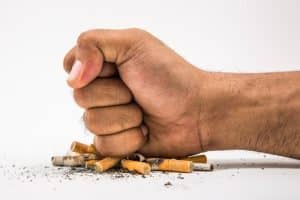A huge risk factor for pain: smoking
April 8, 2019

Quitting smoking may be one of the most significant things you can do to both improve your health and manage your pain.
How smoking affects chronic pain
Smoking is one of the big picture medical factors when it comes to pain. The nicotine in tobacco tricks the body into feeling better, but only initially. It triggers the release of chemicals, like dopamine, which give off a satisfying sensation. This is what makes smoking so addictive. Nicotine is also a pain-killer, but again, the short term effect is overwhelmed by the long term impact on pain and health in general.
To work efficiently, your muscles and joints need a steady supply of oxygen-rich blood. Smoking tightens your arteries and decreases the rate at which oxygen and carbon dioxide are exchanged in your blood. Decreasing blood and nutrient flow can cause degeneration, particularly in discs of the spine, which already have more limited blood flow. The result can be lower back pain and sometimes osteoporosis.
Researchers from Northwestern University released the results of a study that linked smoking with chronic back pain. This is the first study to reveal that smoking interferes with a brain circuit connected with pain, making those who smoke more susceptible to chronic back pain.
The study tracked 160 adults with new cases of back pain, and found that smokers are three times more likely than nonsmokers to develop chronic back pain. The study also revealed that those who quit smoking decreased their chances of developing chronic back pain.
Physicians also link smoking with fatigue and slower healing. These factors can make painful conditions more prominent. Researchers are currently exploring other physiological reasons why smoking makes people with fibromyalgia, arthritis, and other chronic pain hurt more.
Another important factor to note is that smokers aren’t typically good candidates for surgery. If you need an implantable device to help with your chronic pain, smoking makes it much more difficult to fight off potential infection from surgery.
Advice for quitting
We know it isn’t easy to quit. But if you are a smoker, we implore that you make a commitment to trying to quit as it can make a significant difference is the success of treatment for chronic pain. We are happy to talk with our patients about potential medications and/or counseling options to help you quit.
Here are just a few tips to help you quit now:
- Schedule a specific“quit day”
- Ask your primary care doctor or your physician at Southside Pain Specialists about medications or nicotine replacement products
- Talk to family and friends, and ask them for support
- Join a support group
- Take a walk, or do some other safe, healthy activity when you feel the urge to smoke.
- Start a new exercise program to activates endorphins (chemicals in the brain) that can help block or lessen pain
Smokers often assume that they’re mostly just hurting their lungs and increasing their risk of cancer, and while those are huge risks that should not be taken lightly, there is so much more to it than that. Smoking compromises almost every aspect of your health, and quitting can not only decrease your chronic pain, but it can increase your overall health and quality of life.
Southside Pain Specialists is your one-stop shop for pain management
With a multitude of pain relief options tailored to your specific needs, Southside Pain Specialists follow the standards of the American Society of Interventional Pain Physicians, The American Board of Pain Medicine, and the International Spinal Injection Society. We work hard to provide patients comprehensive, caring pain relief when they need it most. Check out our website or contact us today at 205.332.3155 to learn more.
